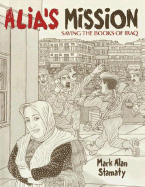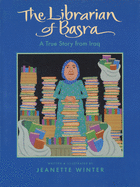Alia Muhammad Baker - Chief Librarian of Al Basrah (Iraq) Central Library, Cultural Heroine

 Iraq has a long and proud history of libraries. The Sumerians, an ancient people who lived in what is now Iraq, invented the first written language almost six thousand years ago. They wrote with a reed on clay tablets in a script we call cuneiform. The first libraries consisted of stacks of these clay tablets.
Iraq has a long and proud history of libraries. The Sumerians, an ancient people who lived in what is now Iraq, invented the first written language almost six thousand years ago. They wrote with a reed on clay tablets in a script we call cuneiform. The first libraries consisted of stacks of these clay tablets.In the 13th Century C.E., Baghdad was a major intellectual center, featuring 36 public libraries and numerous private collections, one of which had a catalog that itself required 10 volumes.
It's been said that history belongs to the victors, and there is a long and sad tradition of burning or otherwise destroying libraries and other cultural treasures during wars and invasions. The 500,000 plus volumes of the great library of Alexandria, Egypt were burned in the third century, destroying priceless treasures. In the thirteenth century, Mongol invaders burned the Nizamiyah library in Baghdad and threw so many books into the the Tigris river that the water was reported to have turned an inky blue.
Alia Muhammad Baker, the chief librarian of Al Basrah Central Library; the Basra, Iraq public library; worked hard to make her library a community gathering place and resource. She was proud of her country's history and the priceless heritage provided by the books in her library. As a child she was impressed and horrified by the story of the burning of Baghdad's Nizamiyah library. When the invasion of Iraq started in early 2003, she worried about the safety of her library's collection. She asked the Iraqi officials for permission to move the books to a safer location and was denied.
When government offices moved into the library and an anti-aircraft gun was placed on the roof, Mrs. Baker started smuggling as many books as her car would hold home every evening. When the British invaded Basra, the government employees left and the library furnishings were looted. Mrs. Baker convinced the owner of the restaurant next door to library for help, and soon neighbors pitched in to help passing books over the wall to safe storage in the restaurant's dining room. The library was burned down before all the books could be saved, but due to Mrs. Baker's efforts, 30,000 books were saved. Once things calmed down in Basra, Mrs. Baker and her husband rented a truck and distributed the books among library employees, friends, and of course, their own home. The library was rebuilt and reopened in 2004 and Mrs. Baker was reinstated as chief librarian.
Mrs. Baker's heroism was first documented in an article by Saila Dewan in the New York Times. Two fabulous children's books followed. The first, Alia's Mission: Saving the Books of Iraq by Mark Alan Stamaty is a graphic novel. Alia's Mission is aimed at readers in the 3rd through 7th grade range, but as an adult I found it interesting and well worth reading. I'm not really a fan of graphic novels, but I loved this one. I particularly liked the page of further information on the history of libraries in Iraq and the Middle East. I also liked how it followed the documented events and only added fictional touches in the form of dialog. The second, Jeanette Winter's The Librarian of Basra, is a beautiful and lavishly illustrated picture book. It does not discuss the war and political issues in detail, but would be an appropriate conversation starter for younger children. The Librarian of Basra is a 2006 American Library Association (ALA), Association for Library Service to Children (ALSC) Notable Children's Book. I did not enjoy it as much as Stamaty's book, but would definitely recommend it for younger children and those who particularly enjoy the art of the picture book.
Photos of war damage to the Basra Central Library and other Iraqi Libraries
  Get your own copy of or from Alibris |
This site needs an editor - click to learn more!
You Should Also Read:
Annotated Bibliography
Middle Eastern Books & Literature
Articles about Iraq
Related Articles
Editor's Picks Articles
Top Ten Articles
Previous Features
Site Map
Content copyright © 2023 by Julie L Baumler. All rights reserved.
This content was written by Julie L Baumler. If you wish to use this content in any manner, you need written permission. Contact
BellaOnline Administration
for details.


